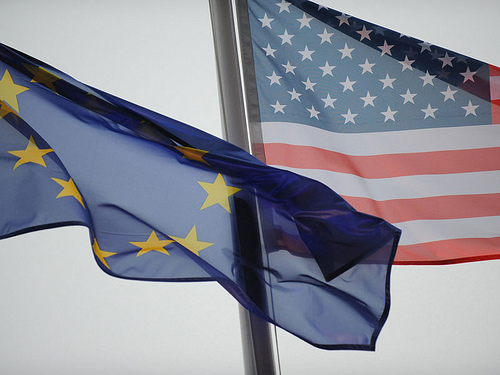
Trade talks between the EU and Georgia proceed with difficulty, and the New York and Frankfurt stock exchanges finalize merger plans.
HEADLINES:
Tunisia and Italy agree on moves to stem migration (Reuters)
Tunisia and Italy have agreed to work together to counter illegal migration after 4,000 migrants landed on the small Italian island of Lampedusa in the past week, Tunisia’s official news agency said on Tuesday.
Russia Embraces Risky Offshore Arctic Drilling (International Herald Tribune)
The Arctic Ocean is a forbidding place for oil drillers. But that is not stopping Russia from jumping in — or Western oil companies from eagerly following.
Russia, where onshore oil reserves are slowly dwindling, last month signed an Arctic exploration deal with the British petroleum giant BP, whose offshore drilling prospects in the United States were dimmed by the Gulf of Mexico disaster last year. Other Western oil companies, recognizing Moscow’s openness to new ocean drilling, are now having similar discussions with Russia.
EU-Georgia trade talks proving ‘difficult’, minister says (EUobserver)
Preliminary talks on a free-trade regime are the "most difficult" part of a broad Association Agreement currently being negotiated between Georgia and the EU, possibly due to objections Tbilisi has raised against Russia joining the World Trade Organisation, Georgia’s chief negotiator has said in an interview.
PKK plan to create chaos ahead of June elections exposed (Today’s Zaman)
A number of individuals were detained yesterday on suspicion of planning to stage terrorist activities to generate chaos ahead of the June elections. According to new intelligence, the Kurdistan Workers’ Party (PKK) has ordered attacks and demonstrations to create tension in the eastern and southeastern provinces.
Germany and Its World War II Victims: Historians Condemn Commemoration Day Proposal (Spiegel Online)
A new parliamentary proposal to establish a commemoration day in honor of those Germans expelled from Eastern Europe following World War II has revived an ongoing debate about Germany’s 20th century history. Dozens of accomplished academics have blasted the idea in an open letter.
New York, Frankfurt stock exchange operators announce merger plans (Deutsche Welle)
Final merger plans between the New York and Frankfurt stock exchange operators are now on the table. But market consolidation across the globe is likely to make regulators wary of a monopoly.
EDITORIALS AND COLUMNS:
The Eurozone According to Merkel (Project Syndicate)
We had almost given up waiting for them, but then they came in a quasi-clandestine form. German Chancellor Angela Merkel did not announce her ideas for eurozone reform in a formal speech or in a statement before her peers. Rather, she allowed a quickly cobbled-together and telegraphic Franco-German non-paper to leak ahead of the recent meeting of European heads of state and government.
Europe’s downpayment on democracy (Financial Times)
The scenes of jubilation in Tunis and now Cairo have a special resonance for Europe. Our modern history also demonstrates the potency of people coming together to fight tyranny – from the boulevards of Paris in August 1944, to the Gdansk shipyards in 1980, to the revolutions across eastern Europe in 1989.
Our history also tells us that the victory of people power is just the start. It takes time, money and care to build the foundations of lasting, deep democracy: not just independent political parties and honest elections but transparent administration, impartial judges, freedom of speech, enforceable property rights and free trade unions. Political and economic reform must go hand in hand. Together they reinforce each other; attempted separately, both are likely to fail.
Compiled with the assistance of Elyse Newman.
Image: transatlantic.jpg
